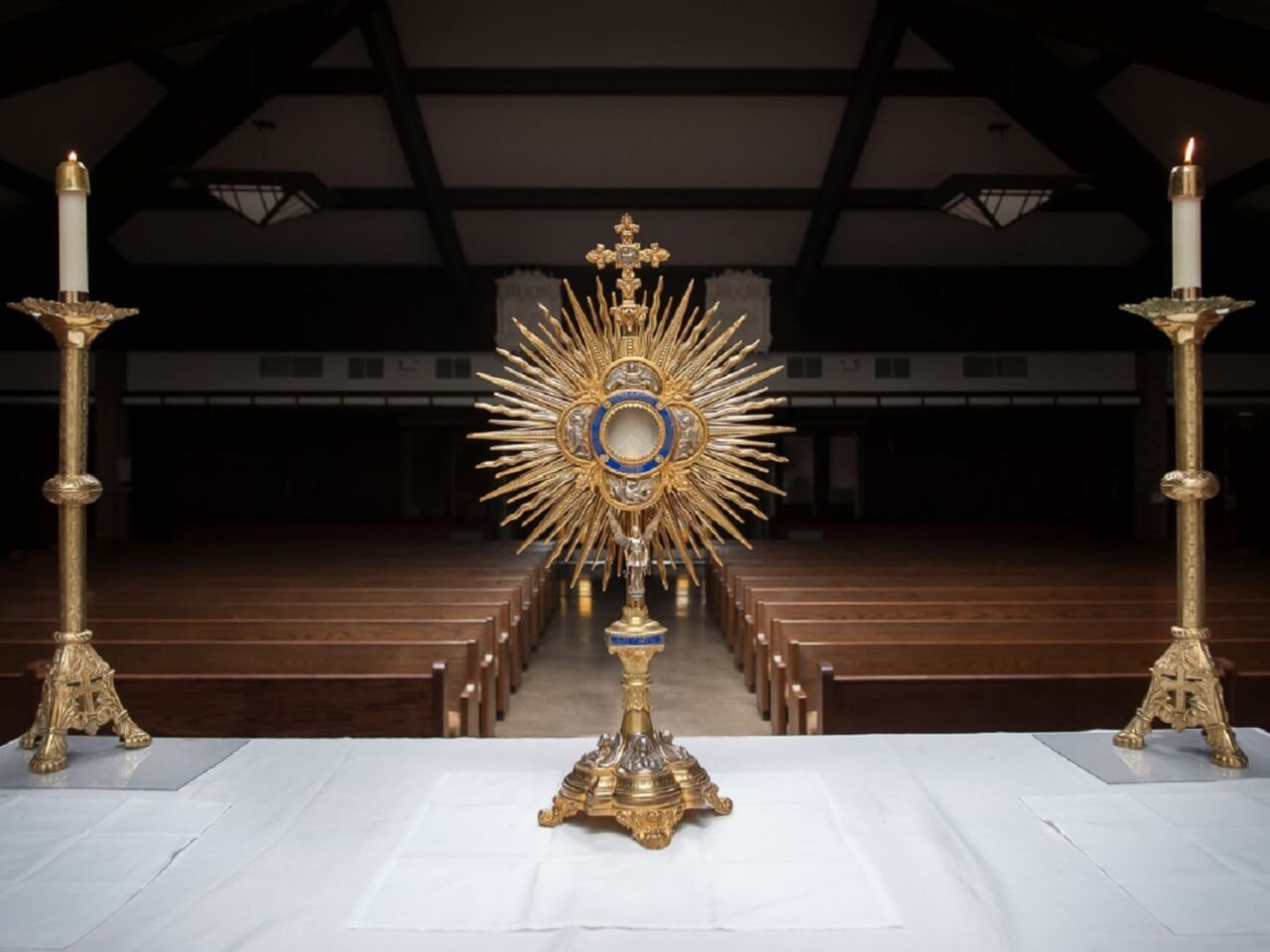Did you know that only 63% of American Catholics believe in the Real Presence of Christ in the Eucharist, and a full 17% of those have no idea that this is what the Church actually teaches?
Roughly half of Catholics surveyed don’t know — with anything approaching doctrinal certitude — this essential truth of our Faith. And I’d be willing to bet that if a larger sample were taken, we’d find even fewer Catholics who actually believe that the Eucharist is truly Christ’s body, blood, soul and divinity. According to a 1994 New York Times/CBS News poll (cited here) in the 18-44 year-old demographic, 70% of self-professed Catholics believed that the Eucharist is “just a symbol.”

In a 2014 reflection on one of the now-infamous Satanic “masses” in Okalahoma City, Msgr. Charles Pope recalled an experience he had 15 years ago while celebrating the traditional Latin Mass at St. Mary, Mother of God, in Washington DC:
As you may know, the ancient Latin Mass is celebrated “ad orientem” (toward the Liturgical East). Priest and people all face in one direction. What this means practically for the celebrant is that the people are behind him. It was time for the consecration. At this time, the priest is directed to bow low with his forearms on the altar table and the host between his fingers.
As directed, the venerable words of Consecration were said in a low but distinct voice, Hoc est enim Corpus meum (For this is my Body). The bells rang as I genuflected.
But behind me there was a disturbance of some sort; a shaking or rustling sound came from the front pews behind me to my right. And then a moaning or grumbling. “What was that?” I wondered. It did not really sound human, more like the grumbling of a large animal such as a boar or a bear, along with a plaintive moan that also did not seem human. I elevated the host and again wondered, “What was that?” Then silence. As the celebrant in the ancient Latin Mass I could not easily turn to look. But still I thought, “What was that?”
It was time for the consecration of the chalice. Again I bowed low, pronouncing clearly and distinctly but in a low voice, Hic est enim calix sanguinis mei, novi et æterni testamenti; mysterium fidei; qui pro vobis et pro multis effundetur in remissionem pecatorum. Haec quotiescumque feceritis in mei memoriam facietis (for this is the cup of my Blood, of the new and eternal covenant; the mystery of faith; which will for the many be shed unto the remission of sins. Whensoever you do this, you do it in my memory.)
Then, I heard another sound, this time an undeniable moan and then a shriek as someone cried out, “Leave me alone, Jesus! Why do you torture me?” Suddenly there was a scuffling noise and someone ran out with the groaning sound of having been injured. The back doors swung open and then closed. Then silence.
Realization – I could not turn to look for I was raising the Chalice high over my head. But I knew in an instant that some poor demon-tormented soul had encountered Christ in the Eucharist and could not endure His real presence displayed for all to see. And the words of Scripture occurred to me: Even Demons believe and tremble (James 2:19).
Repentance – But just as James used those words to rebuke the weak faith of his flock, I too had to repent. Why was a demon-troubled man more aware of the true presence and more astonished by it than I was? He was moved in a negative sense and ran. Why was I not more moved in a positive but comparable way? What of the other believers in the pews? I don’t doubt that all of us believed intellectually in the true presence. But there is something very different and far more wonderful in being moved to the depth of your soul! It is so easy for us to be sleepy in the presence of the Divine, to be forgetful of the miraculous and awesome Presence available to us.
This is startling at first glance, but upon further reflection, makes perfect sense. The fallen angels absolutely know the true nature of the Eucharist. They have a metaphysical understanding that surpasses merely human knowledge.
Acting like the Eucharist is what we profess it to be — through reverent liturgy, exposition and benediction of the Blessed Sacrament, adoration, Corpus Christi processions, and the like — makes a huge difference in our own belief and understanding of this sacred mystery.
Originally published on September 2nd, 2014.


